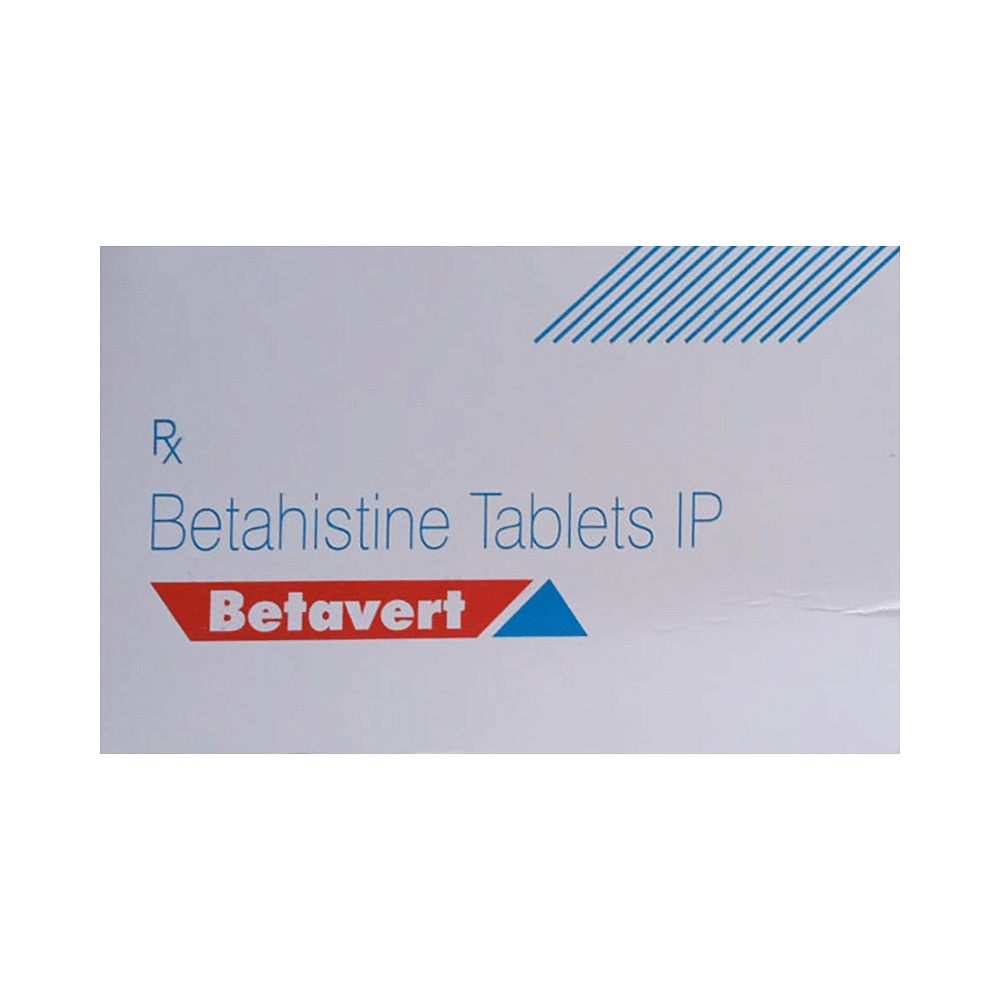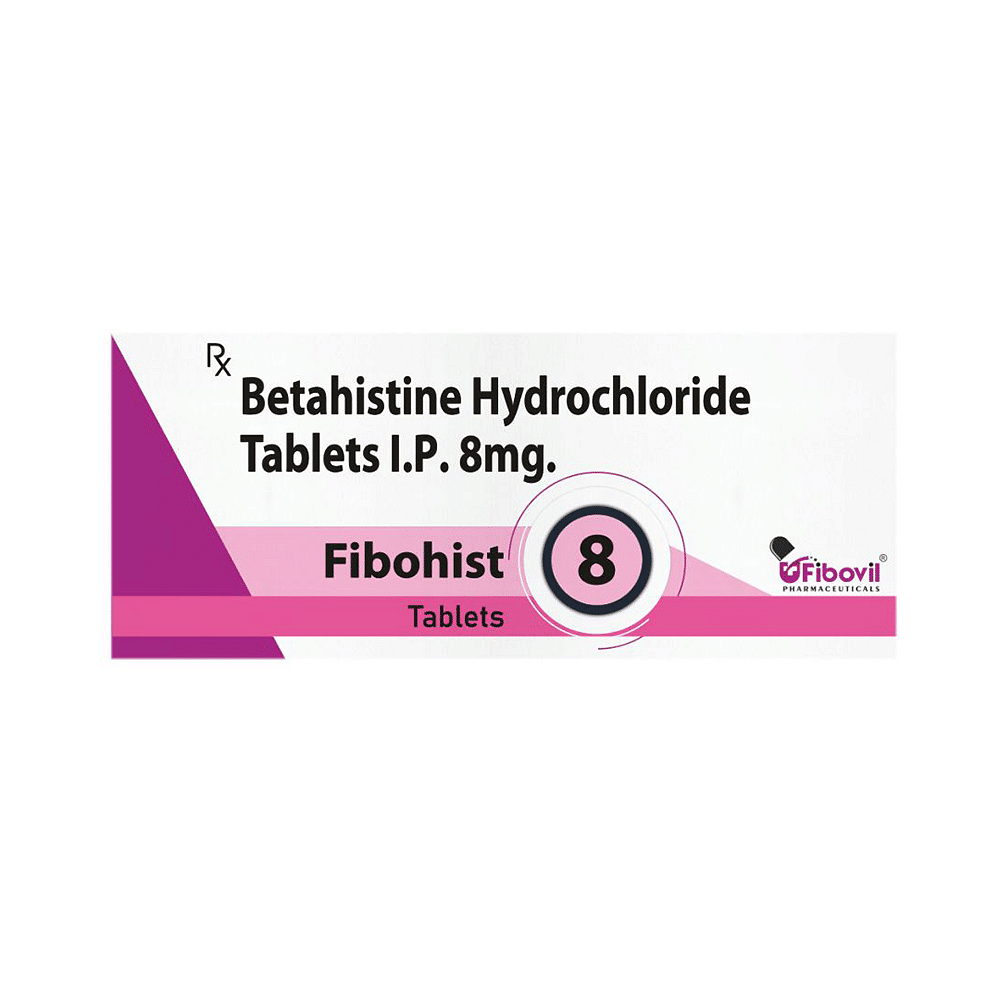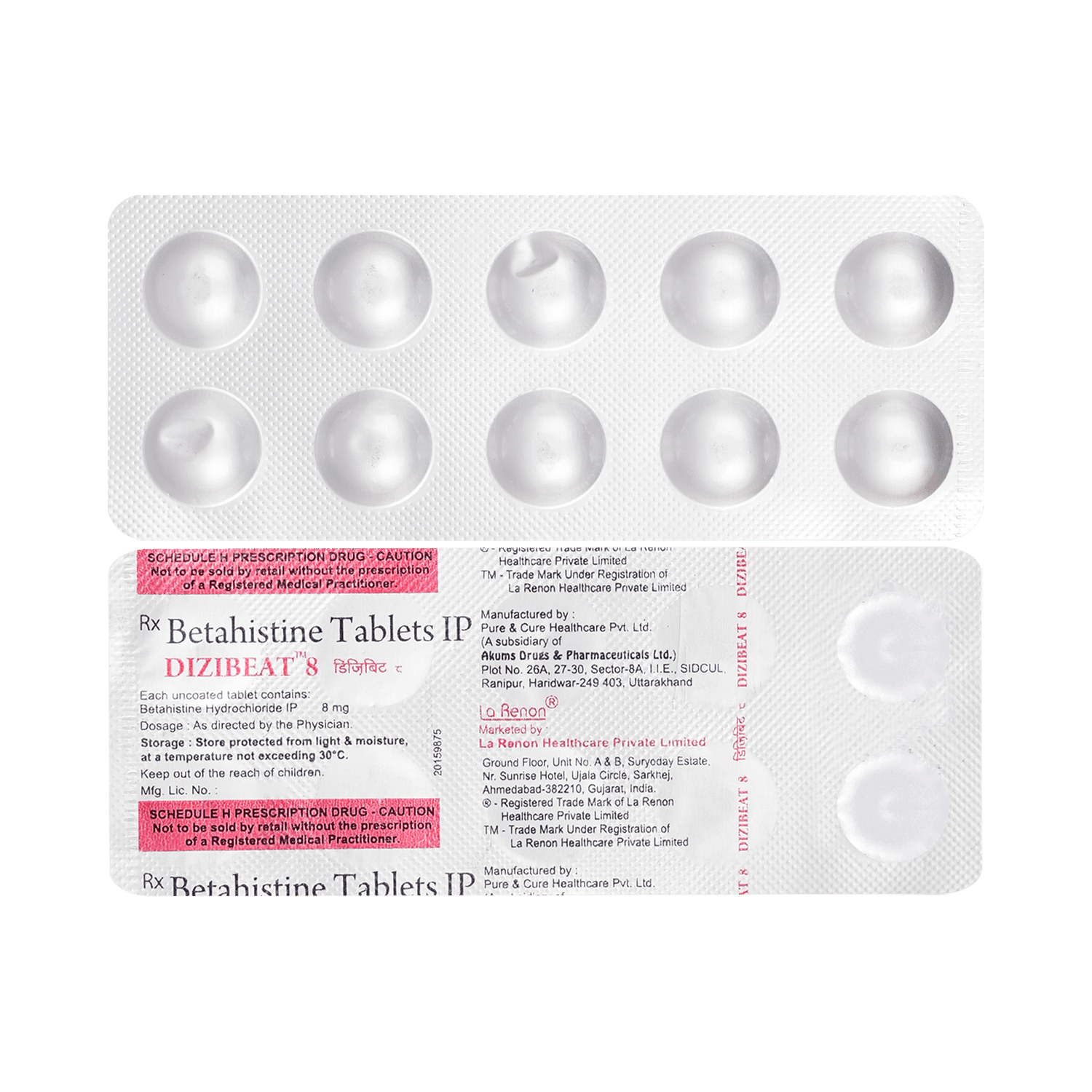
Betadus 8mg Tablet
Manufacturer
Radius Healthcare Pvt Ltd
Salt Composition
Betahistine (8mg)
Key Information
Short Description
Betadus 8mg Tablet is used to prevent and treat a disorder of the inner ear known as Ménière’s disease.
Dosage Form
Tablet
Introduction
Betadus 8mg Tablet should be swallowed whole with water and taken at the same time(s) each day to get the most benefit. Your doctor will decide what is the correct dose to relieve your symptoms and how often you need to take it. You may need to take this medicine for several months and you should take it for as long as prescribed by your doctor even if you start feeling better.
Directions for Use
Take this medicine in the dose and duration as advised by your doctor. Swallow it as a whole. Do not chew, crush or break it. Betadus 8mg Tablet may be taken with or without food but it is better to take it at a fixed time.
How it works
Betadus 8mg Tablet is a histamine analog. It works by improving the blood flow in the inner ear which reduces the pressure of excess fluid there. Excess fluid can send signals to the brain causing nausea, dizziness or spinning sensations (symptoms of Ménière's disease). Betadus 8mg Tablet additionally dampens down the nerve signals sent from the inner ear to the brain relieving the symptoms of Ménière's disease.
Quick Tips
You have been prescribed Betadus 8mg Tablet to relieve vertigo (dizziness) Healing problems and tinnitus (noise in the ear) associated with Ménière's disease It can only decrease the number and severity of attacks but may not completely stop them Take it at the same time each day to maintain a steady amount of the medicine in your body Inform your doctor if you have a history of stomach ulcer, asthma or low blood pressure Inform your doctor if you are pregnant, planning pregnancy or breastfeeding
Related Medicines

Vertin 8 Tablet

Betavert Tablet

Fibohist 8 Tablet

Vertigard 8mg Tablet

Dizibeat 8mg Tablet

T Hist 8mg Tablet

Megavert 8mg Tablet

Histiv 8mg Tablet

Betagold 8mg Tablet

Vitorine 8mg Tablet
Frequently asked questions
What is Meniere's disease? Does it go away?
Meniere's disease is a disorder of the balance and hearing organs in the inner ear. Symptoms include vertigo (dizziness), fluctuating hearing loss, tinnitus (ringing in the ears), and pressure in the ears. Dizziness may lead to nausea and vomiting. The treatment for Meniere's disease is tailored to individual needs, with open discussion with your doctor determining the best approach.
Is Betadus 8mg Tablet effective?
Betadus 8mg Tablet can be effective when used as prescribed by your doctor. Do not stop taking it even if you see improvements in your condition. If you abruptly stop using Betadus 8mg Tablet, symptoms may return or worsen.
What are the triggers for Meniere's disease?
Meniere's disease can be triggered by various factors such as stress, overwork, fatigue, emotional distress, additional illnesses, and pressure changes. Certain foods like dairy products, caffeine, alcohol, and high-sodium foods may trigger symptoms. A low-salt diet (2 grams/day) can help control vertigo in Meniere's disease.
What if I forget to take a dose of Betadus 8mg Tablet?
If you miss a dose of Betadus 8mg Tablet, take it as soon as you remember. However, if it is almost time for your next dose, skip the missed dose and take the next dose at the scheduled time. Do not double the dose to make up for the missed one, as this may increase the chances of side effects.
Is stress a reason for vertigo?
Yes, mental stress can trigger vertigo. It may worsen existing vertigo but does not cause it on its own.
What are the causes of vertigo?
Vertigo can be caused by sudden drops in blood pressure or dehydration. Many people experience lightheadedness when transitioning quickly from a sitting or lying position. Certain medications, inner ear problems (like Meniere's disease or acoustic neuroma), motion sickness, and head trauma also contribute to vertigo. It is important to remember that sometimes vertigo can indicate other disorders (multiple sclerosis, following head injuries).
How long should Betadus 8mg Tablet be taken?
The duration of Betadus 8mg Tablet treatment varies among individuals. Some experience rapid improvement while others take a bit longer. Therefore, it is crucial to take the medication regularly and patiently await the results. Consult your doctor if you are unsure about your dosage.
What are the common side effects of Betadus 8mg Tablet?
Betadus 8mg Tablet can lead to mild stomach problems like vomiting, stomach pain, abdominal swelling (bloating), and bloating. To minimize these side effects, consider taking Betadus 8mg Tablet with food. However, the medication's absorption may decrease when taken with food.
Is Betadus 8mg Tablet effective?
Betadus 8mg Tablet is effective if used in the prescribed dosage and duration by your doctor. Do not stop taking it even if you see improvements in your condition. If you abruptly stop using Betadus 8mg Tablet, symptoms may return or worsen.
What if I forget to take a dose of Betadus 8mg Tablet?
If you miss a dose of Betadus 8mg Tablet, take it as soon as you remember. However, if it is almost time for your next dose, skip the missed dose and take the next dose at the scheduled time. Do not double the dose to make up for the missed one, as this may increase the chances of side effects.
How long should Betadus 8mg Tablet be taken?
Duration of Betadus 8mg Tablet treatment varies between individuals. Some experience rapid improvement while others take a bit longer. It is crucial to take the medication regularly and patiently await the results. Consult your doctor if unsure about your dosage.


